Managing digital badges and certificates at scale can quickly become overwhelming, especially when security and verification are top priorities. I've seen organisations struggle with manual processes, fragmented tools, and concerns about fraud or data privacy.
If you're tasked with recognising achievements—whether for online courses, corporate training, or university programmes—finding the right digital credential platform is essential. In this article, I'll break down what sets leading solutions apart, from blockchain-backed verification to automation and analytics.
You'll get a clear look at how platforms like VerifyEd, Certopus, Credly, Accredible, and others handle branding, bulk issuance, integrations, and pricing. I'll also highlight real-world results, such as reduced admin time, improved badge sharing, and measurable engagement gains.
By the end, you'll know exactly which features matter most for your needs and how to compare options for secure, scalable badge management in 2025.
Understanding Top Digital Credential Platform
Defining Digital Credential Platforms
Digital credential platforms are specialised software designed to create, manage, and verify digital badges and certificates.
These systems allow organisations to formally recognise achievements such as course completions or professional milestones, all within a secure, electronic format.
Instead of issuing printed certificates or ID cards, digital platforms emphasise online accessibility and simple verification.
The evolution of credentials is a journey from paper to pixels, representing a fundamental shift in how achievements are issued, managed, and verified in the digital era.
This approach is distinct from IT systems used for signing into accounts; here, the emphasis is on acknowledging skills and learning.
The credentials themselves—like digital badges or certificates—function as portable, verifiable records of a person’s development or accomplishment.
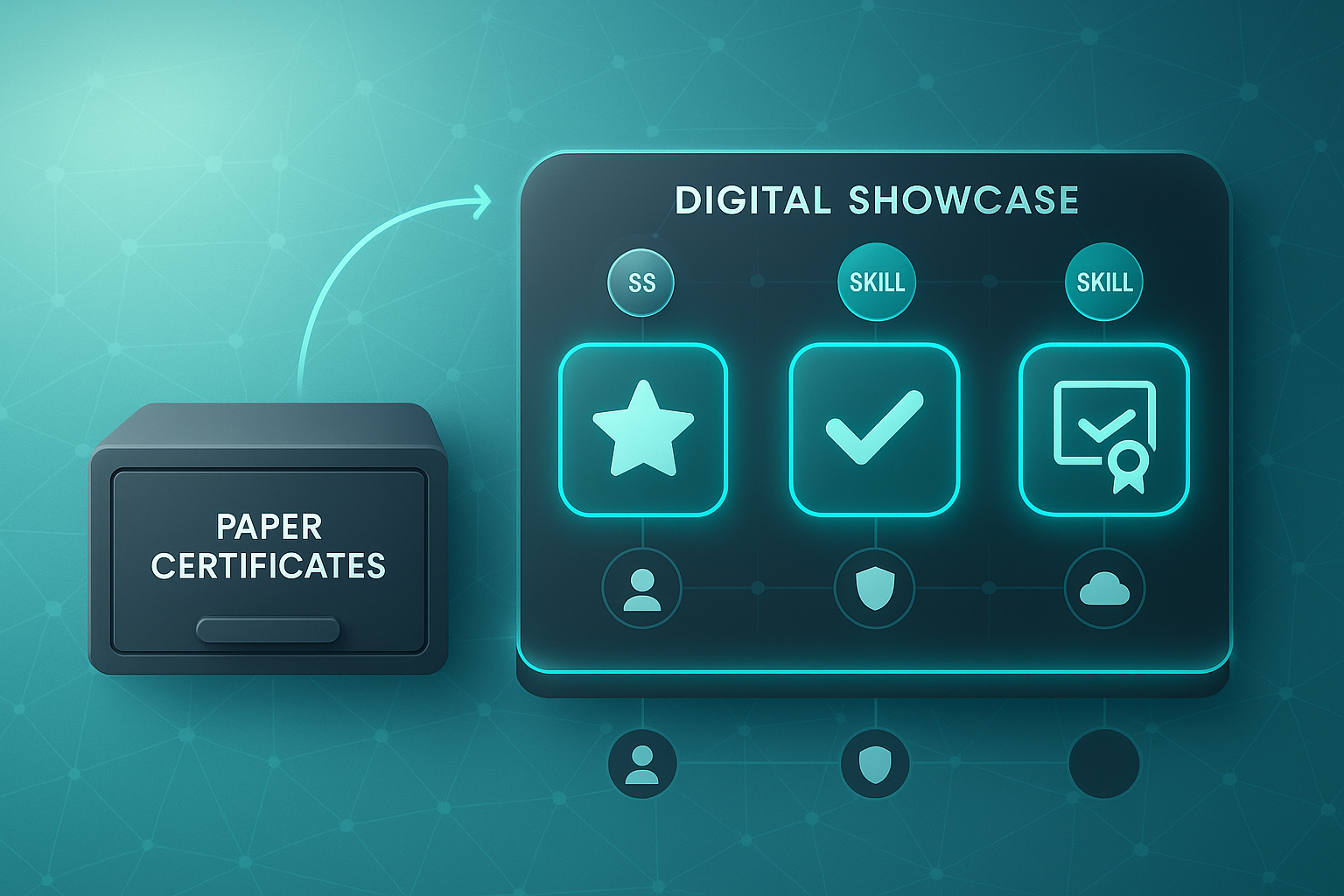
Think of it as a digital showcase, rather than something tucked away in a drawer.
Who Uses Digital Credential Platforms—and Why?
A diverse group relies on these platforms.
Online course providers, MOOC platforms, universities, colleges, and corporate training teams all turn to digital credential tools.
For such organisations, digital credentials help streamline record-keeping, make achievement recognition more scalable, and allow for easier tracking.
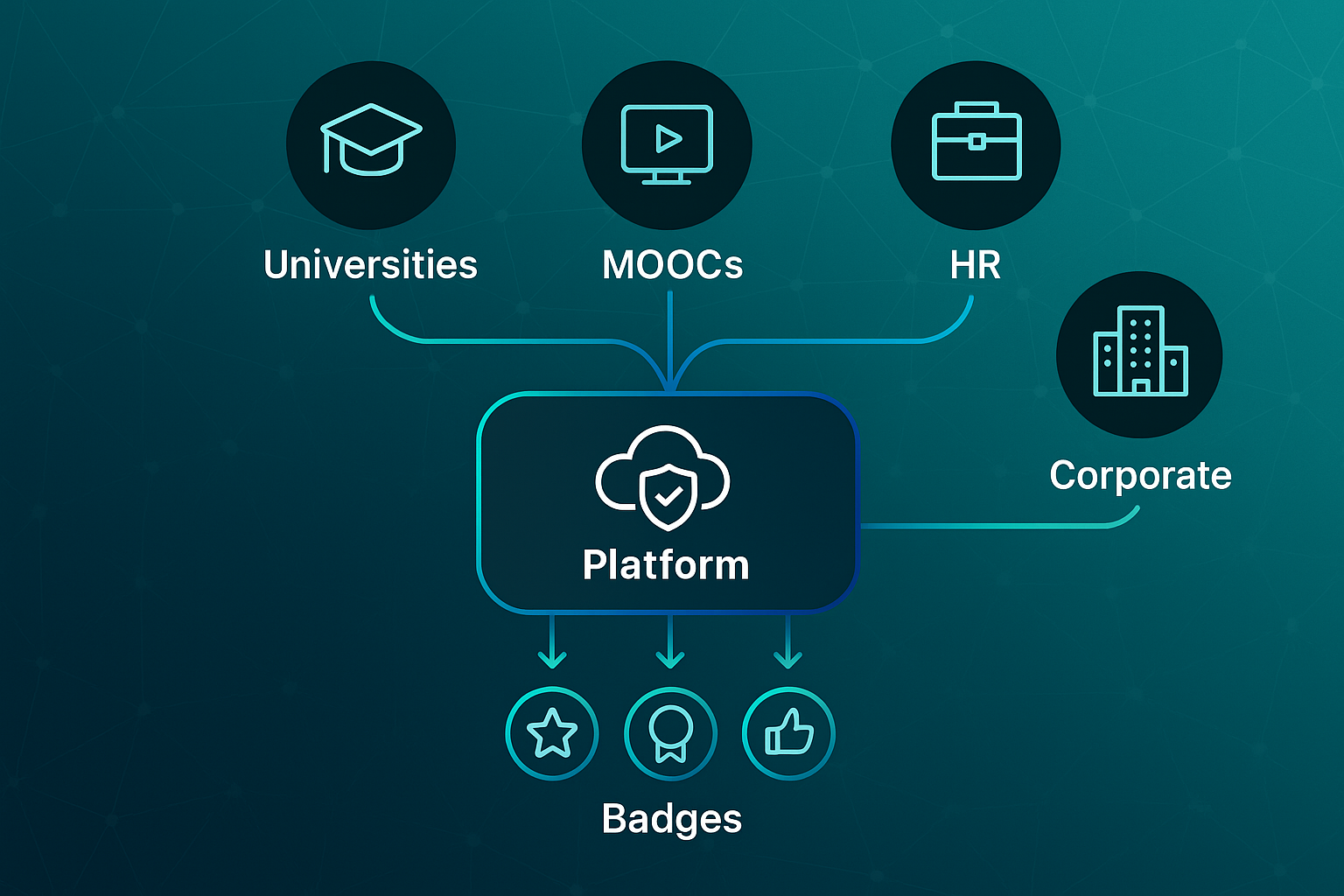
HR departments, for example, use them to monitor and verify staff learning.
Educational institutions employ these systems for issuing official digital certificates and microcredentials.
Why Digital Credential Platforms Matter in Online Education
What makes these platforms so significant in online education? The answer comes down to visibility and portability.
Digital badges and certificates can be awarded when learners complete a course or meet certain milestones—with the timing and method flexible to the organisation.
This lets learners share their achievements on CVs or social networks, which can boost both personal and institutional reputation.
In a sense, the platforms provide a modern bridge between accomplishment and recognition—especially valuable in digital-first environments.
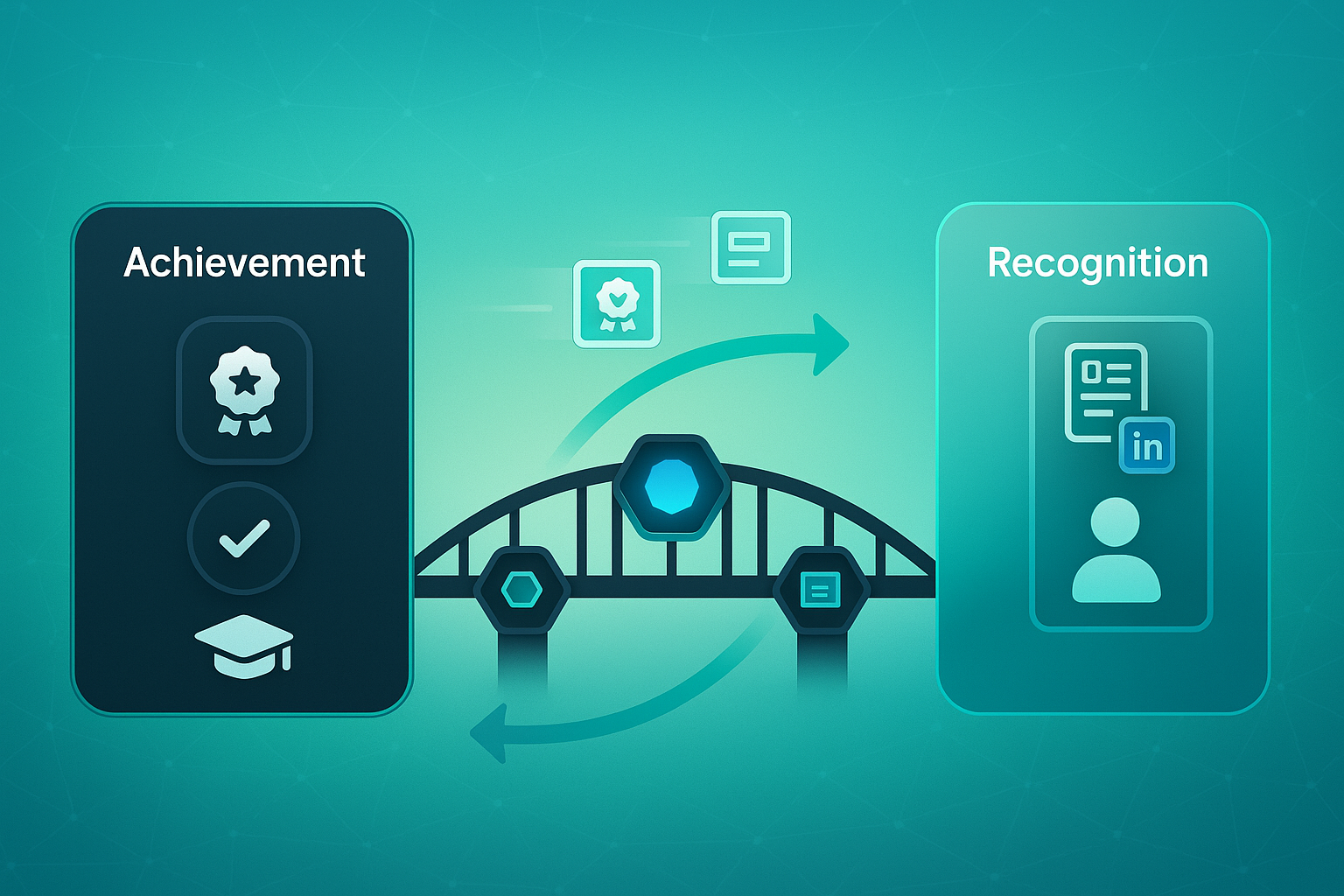
Common Challenges and Misconceptions
Scaling up digital credential programmes isn’t always straightforward.
Organisations face hurdles such as managing high numbers of records and preventing fraud or tampering.
Digital credentials, such as digital badges and certificates, offer a more secure and verifiable way of recognizing and sharing achievements than traditional paper-based credentials. However, digital credentials are not immune to fraud either. They can be copied, edited, or fabricated using various tools and techniques.
Security is a real concern, so strong platforms implement features like encryption or even blockchain to keep credentials trustworthy.
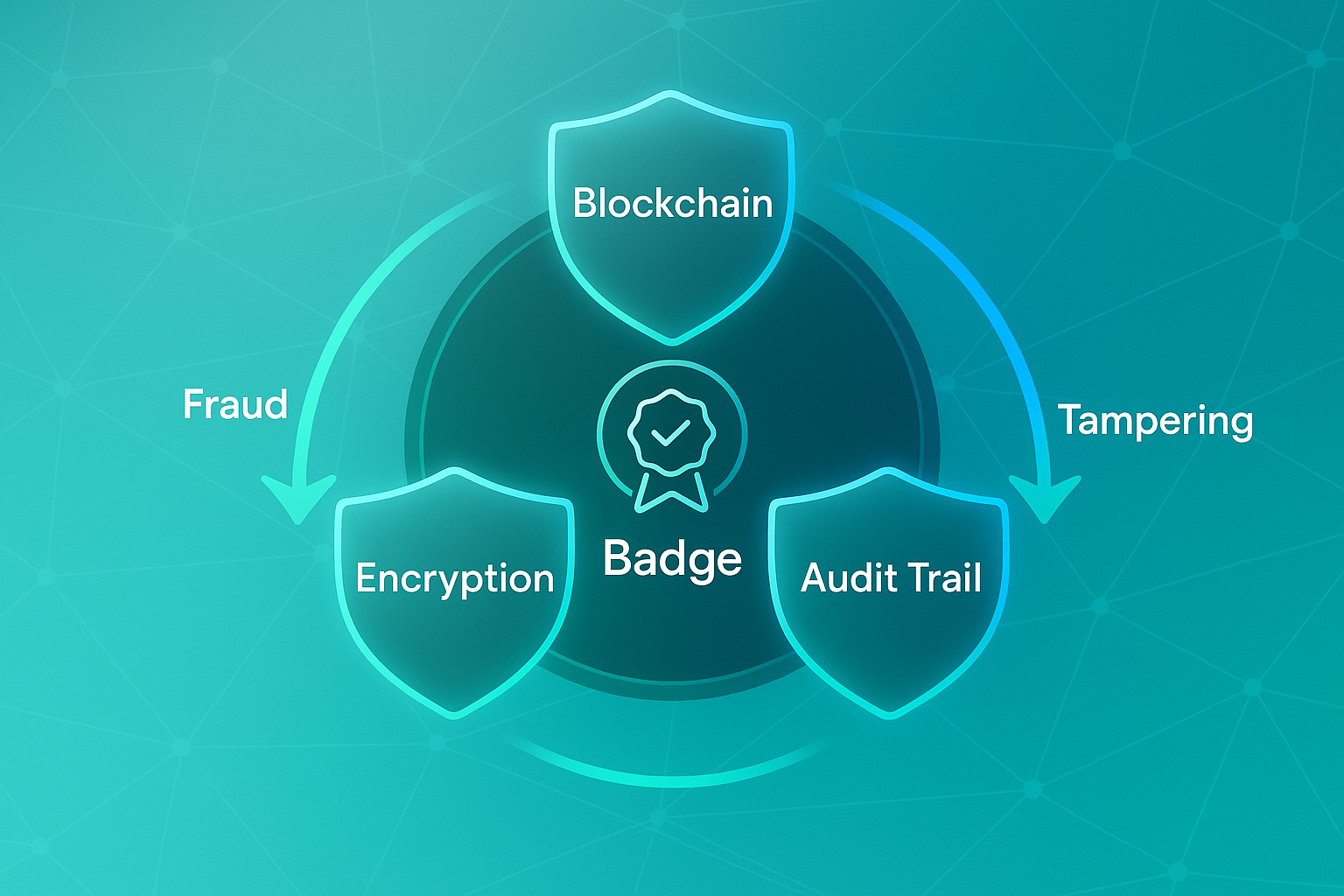
It’s easy to confuse these platforms with log-in or identity systems, but only digital credential tools actually document and verify learning results.
Core Components and Essential Concepts
Every leading digital credential platform includes some fundamental features:
- Credential Design
Tools for flexible badge or certificate creation, letting institutions match their branding and requirements. - Awarding Mechanisms
Options to issue credentials automatically or manually, based on organisational workflow. - Management Tools
Facilities for tracking, updating, and overseeing the life cycle of digital credentials. - Secure Verification
Technologies that ensure credentials can be checked for authenticity by employers or other institutions. - Industry Standards
Support for frameworks like Open Badges or W3C Verifiable Credentials to ensure interoperability and trust.
With these features in mind, understanding these foundations sets the scene for smarter decisions.
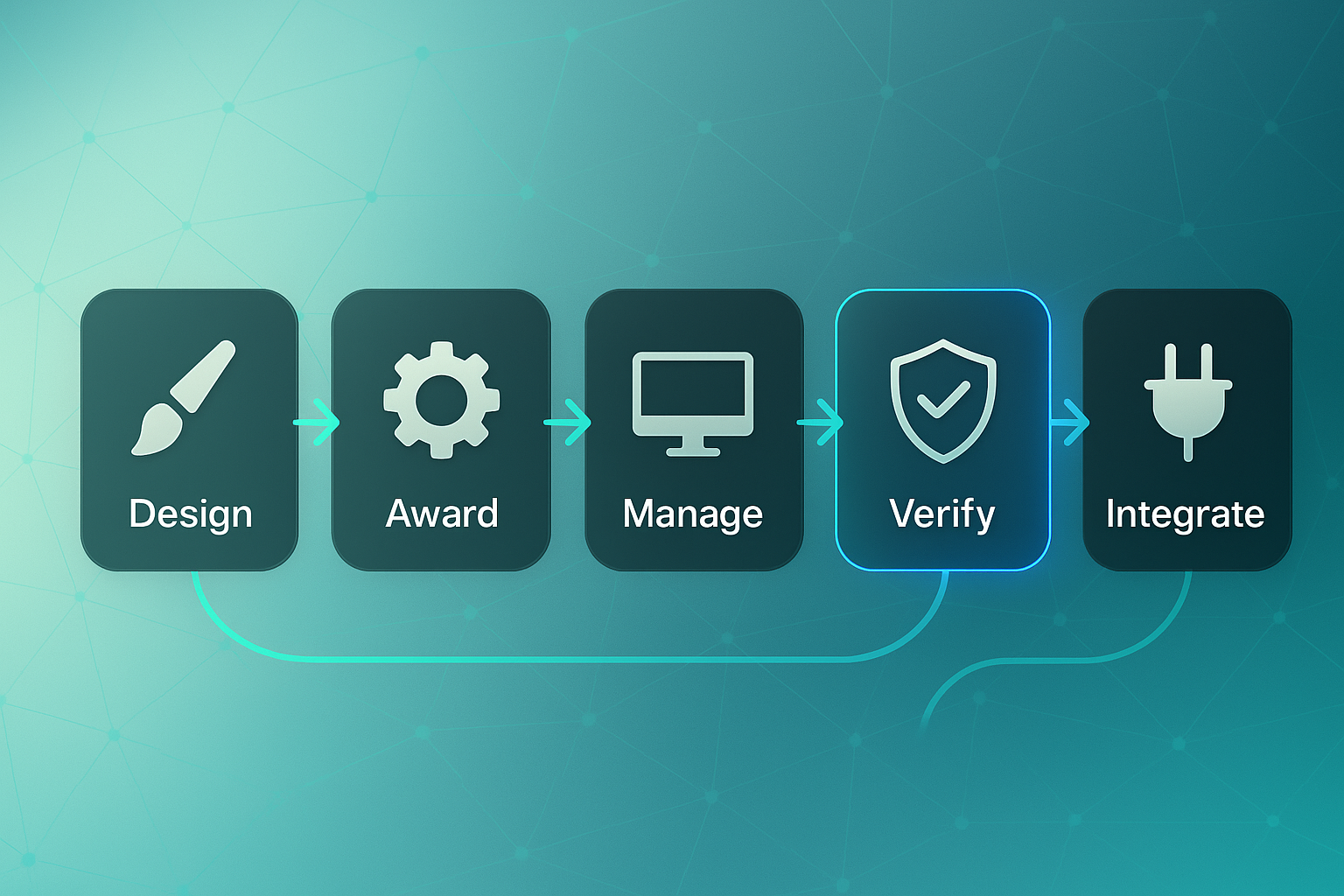
Next, we’ll look at what matters most when comparing digital credential platforms—such as the need for security, integration, and scalability in different settings.
How to Evaluate Top Digital Credential Platforms: Essential Criteria for 2025
Blueprint for Decision-Making: Matching Platform Features to Online Training Needs
Selecting a digital credential platform in 2025 isn’t a matter of ticking boxes. Each system brings its own mix of features that shape badge trust, user experience, and overall cost, and for online course providers giving out thousands of certificates, these differences really add up.
With so many factors to weigh, how do you sort through the noise? The following criteria, explained with concrete examples and measurable outcomes, will point you in the right direction.
White-Label Controls and Branding
Branding has a bigger effect than most expect. Among the top platforms, BCdiploma and Certopus offer true white-label experiences—no vendor logos, broad language support, and complete brand control—while Certifier and Credly also deliver strong branding options, though with a bit less flexibility. The impact is tangible: one MOOC provider saw a 70% jump in badge sharing after switching to full branding.
Batch Automation and API Integration
When scale matters, automation is key. Certopus, Certifier, and Canvas Credentials lead the way with advanced batch-issuing via API or webhook, meaning learners typically receive their certificates within minutes of completing a course. In practice, Certopus has slashed admin effort by up to 90% when automating bulk badge delivery to over 2,500 recipients.
Automation tools can now handle repetitive tasks such as form filling, data entry, and follow-ups, freeing up administrative staff to focus on more complex issues.
Blockchain Verification & Security
Security isn’t just a buzzword for online credentials. Platforms such as VerifyEd, BCdiploma, Credly, and Accredible offer blockchain or tamper-proof verification, which lets employers and the public instantly trust credentials. By comparison, platforms like SimpleCert and Sertifier stick to QR codes or audit trails, adding manual steps to the verification process.

Seamless LMS and HRIS Integration
Deep integration pays off for volume providers. Certifier, Certopus, SAP Litmos, and Credly handle real-time badge sync with major LMS and HRIS platforms through SSO and REST APIs, allowing learners’ credentials to appear in dashboards within an hour. This makes analytics and marketing far easier for large-scale providers.
Transparent High-Volume Pricing
When working at scale, up-front pricing is essential. Here’s how the top options compare for issuing 10,000 badges:
- Certopus
Approx. $2,000–$3,000 for 10,000 badges. - Certifier
Approx. $1,500–$2,500 for 10,000 badges. - VerifyEd
£0.75/credential for bulk purchase. - Credly
$3,000–$5,000 for 10,000 badges. - Accredible
$3,000+ for 10,000 badges.
After evaluating criteria such as automation, trustworthy blockchain verification, smooth integrations, and transparent pricing, it’s possible to halve admin time and boost learner engagement by up to 70%—all while keeping your budget on track. Next, each solution will be examined in detail, starting with our blockchain-secured platform and its volume-based pricing.
VerifyEd: Blockchain Security, Automation, and Scalable Pricing for MOOCs
Blockchain Verification: Solving Trust and Fraud Pain Points
Managing digital badges at scale usually means headaches—manual checks, fraud worries, and endless admin queries. VerifyEd turns this around by cryptographically signing every badge and permanently writing each one to a decentralised blockchain ledger. Learners and employers can instantly confirm authenticity, without the usual wait for admin teams or risk of manipulation.
What’s the real difference? Unlike platforms using central databases or QR codes, VerifyEd’s blockchain system eliminates tampering, data corruption, and lost records. Admins spend far less time answering “Is this real?” and chasing up fraud investigations.

End-to-End Credential Lifecycle and Automated Batch Issuance
Design and issuance start with full branding control—change badge or certificate designs to match any programme. Credentials go out in bulk by CSV file or in real time with REST API connections. A MOOC can hand out certificates to 5,000 learners in just ten minutes.

With real-time dashboards, audit trails for compliance, and exportable status reporting, admin oversight is easier and faster. Accreditation and partnership workflows move along much more quickly since there is less need for manual follow-up.

LMS Integration for Streamlined Workflows
Connecting VerifyEd with your learning platform is straightforward. You get LTI (Learning Tools Interoperability), REST API access, and single sign-on. Course completions in Moodle or Canvas automatically trigger badge delivery—cutting out clunky export/import work entirely. Admins see up to a 90% reduction in manual credential handling, and IT teams benefit from robust error tracking and live dashboard insights.
Transparent, Scalable Pricing for Course Providers
Costs are refreshingly predictable. With a pay-per-credential model and volume discounts as low as £0.75 per badge (so, 10,000 badges for £7,500), budget planning is easy—no seat licences or annual contracts. By comparison, major competitors like Credly or Accredible run $3,000–$5,000 for similar volumes.
Real-World Impact: Learner Motivation and Marketing
Stackable badge features let learners collect credentials for every module and instantly share achievements on LinkedIn or social media. Where instant issuance and branding are used, some MOOC providers have seen badge sharing jump by 70%. Recruiters value the authenticity of blockchain badges, making courses more attractive and supporting repeat enrolment.
The strategic use of digital badges serves a dual purpose: they gamify the learning journey to enhance student motivation, and their shareable nature transforms educational achievements into organic marketing assets that drive business growth.
Summary: Why VerifyEd Stands Apart
With blockchain-backed verification, bulk and automated delivery, seamless LMS integration, and no-nonsense pricing, VerifyEd is built for online education at scale. It solves the biggest headaches for MOOC providers: trust, admin workload, integration, and motivation. So, now you’ve seen how VerifyEd’s blockchain approach sets a new standard—next, we’ll explore how other platforms compare with their own unique strengths and trade-offs.
Looking to improve your course sales, marketing & experience?
Book a free course optimisation strategy call with one of our specialists.
Book a call
Certopus: Automation and Cost Efficiency for Scalable Badge Delivery
Automation and Integration for Peak Badge Issuance
Certopus is designed for fast, high-volume automation in MOOCs and online training. With the ability to upload thousands of recipients, integration options for Moodle, Canvas, Zoom, or Zapier, and automated badge delivery scheduling, admin tasks are streamlined with almost no manual work. Through API or Zapier, Certopus can deliver 5,000 badges in under 20 minutes. When the admin queue clears in minutes instead of days, it transforms the workflow for large-scale badge issuers.
Transparent High-Volume Pricing
Let’s put the numbers on the table. Certopus operates a 2025 pay-as-you-go model: $19/month delivers 1,000 badges, $69/month covers 5,000, and each extra 1,000 adds just $10. Bulk rates are between $0.50–$1 per credential, eliminating the need for annual contracts or seat licences. For organisations with surging enrolments or seasonal events, this flexible approach makes it easy to pay only when needed.
But can your old system really keep pace with sudden spikes? For direct comparison, here’s a straightforward table showing badge volumes and costs across leading platforms:
| Badge Volume | Certopus Cost | Credly Cost | Accredible Cost | Sertifier Cost |
|---|---|---|---|---|
| 1,000 | $19 | $3,000–$5,000 | $3,000–$5,000 | $1,590 |
| 10,000 | $169 | $30,000–$50,000 | $30,000+ | $15,900 |
| 50,000 | $569 | $150,000+ | $150,000+ | $79,500 |
What stands out from this comparison is Certopus’s competitive pricing for large-scale issuance. Big cohorts unlock major savings, making budget control much easier—no slow approvals, no surprise invoices, and reporting is straightforward.
Frictionless Delivery, Wallet Integration, and Validation
Badge sharing with Certopus is simple and efficient. Learners receive single-link emails with no log-in hurdles, and credentials are wallet-ready for instant download and verification. Security features include HMAC-SHA256 cryptographic signatures, blockchain integration, IPFS file storage, Open Badges 3.0 compatibility, and privacy via PolygonID, keeping credentials secure and portable.
Beyond security, Certopus also excels for small teams and pilot events. The following scenario table highlights strengths compared to common competitor issues:
| Scenario | Certopus Strength | Competitor Gap |
|---|---|---|
| Bulk issuance | Fast automation, low cost | Manual effort, higher price |
| Branding all tiers | White-label by default | Restricted branding on lower plans |
| Sharing/support | No accounts, instant sharing | Account/app barriers, support tickets |
| Flexibility | Monthly billing, no lock-in | Contract lock-in, minimum spend |
If you’re handling thousands of badges per cohort, Certopus’s automation and direct branded delivery can dramatically reduce support problems and admin time. Flexible monthly billing allows for easy scaling without contract headaches. For small projects, while upfront savings may be less pronounced, the process remains smooth and support remains strong. Certopus delivers less friction, more control, and solves the common challenge of missing badge requests—making admin headaches a thing of the past.
Credly: Unlimited Issuance and Advanced Analytics for Scalable MOOCs
Enterprise Licensing for Predictable High-Volume Badge Delivery
What’s the smartest strategy when your organisation awards thousands of badges each month?
Credly offers an annual enterprise licence—that means unlimited badge issuance for one predictable yearly fee, usually $5,000 to $18,000+ based on volume and contract scope.
Universities and large MOOCs gain genuine budget stability, which can be hard to achieve with pay-as-you-go platforms.
The onboarding is a bit of a journey.
You’ll move through scoping, a pilot phase, and full setup—which generally takes two to six weeks.
That’s longer than Certopus or Sertifier offer, but for programmes running all year, the security of a fixed price pays off quickly.
Here’s a clear snapshot to compare the main platform options:
| Feature | Credly (Enterprise) | Accredible (Per-Badge) | Certopus (Per-Badge) | Sertifier (Per-Badge) |
|---|---|---|---|---|
| Pricing Model | Annual licence, unlimited | $1–$3 per badge | $0.50–$1 per badge | ~$0.75–$1.50 per badge |
| Annual cost (10K badges) | $5,000–$18,000 | $10,000–$30,000 | $5,000–$10,000 | $7,500–$15,000 |
| Branding | Full white-label, multi-org | Premium only | Default | Yes |
| Analytics | Real-time, downloadable | Basic | Basic | Enhanced |
| Integrations | Canvas, Moodle, xAPI (Experience API), Zapier | Canvas, Moodle, xAPI, Zapier | Canvas, Moodle, Zapier | Canvas, Moodle |
| Social Metrics | Yes (LinkedIn, X, FB) | No | No | Basic |
| Languages | 15+ | 10+ | 5+ | 10+ |
| Setup Timeline | 2–6 weeks | 2–7 days | 1–2 days | 1–2 days |
| Fit | Large MOOCs, universities | Mid-size | Scale-ups | Small to mid-scale |
Now, how do you pick wisely?
If your priority is budget predictability, Credly’s fixed fee model is a big win—especially for high volumes.
Add in its advanced analytics (real-time tracking, downloadable reports, automated marketing summaries), and you’re positioned to measure both impact and engagement with pinpoint accuracy.
But every organisation has a unique badge landscape.
Here’s what’s important for different scenarios:
Before you make the leap, weigh these pros and cons:
- Credly
Predictable annual fee, robust analytics, and multi-org branding—perfect for universities and MOOC giants. The catch: setup takes longer, and every badge claimant must create an account. - Certopus
Fast launch and flexible billing for pilot projects—great for starts and stops, but prices can spike with bigger volumes. - Sertifier
Ideal for smaller, cost-driven teams; setup is quick, features are solid, but analytics and sharing tools are more basic. - Accredible
Suits mid-sized credentials programmes—moderate outlay, standard tracking, faster onboarding than enterprise setups.
Here’s a tip: For complex, recurring credentials across multiple departments, Credly’s real-time analytics will give decision-makers exactly what they need.
Quick launches and easy scaling? Certopus and Sertifier clearly suit smaller teams.
The real puzzle is balancing budget control against speed and customisation; think hard about which trade-off will affect you most this year.
That’s the practical breakdown—focus on your volumes, reporting needs, and how quickly you want to go live.
Next, we’ll explore Accredible’s position for institutions ready to scale up digital credential delivery.
Credly: Global Network and Analytics Power for Market-Driven MOOCs
Unmatched Employer Network and International Badge Reach
Credly stands out for scale, connecting over 4,000 issuers and enabling 70 million badges across 195+ countries in 2025.
Its live employer network is impressive—badges sync with LinkedIn Talent Solutions, Indeed, and employer dashboards. MOOC providers often see up to 18% more interview invites after switching badge delivery to Credly.
Analytics and Learner Engagement Insights
Are your credentials making a real impact? Credly’s dashboard lets you track badge issuance, acceptance rates, and employer click-throughs, so you get a full picture.
Issuers can benchmark their campaigns against industry averages, seeing tangible gains: one university achieved a 22% jump in enrolments by using analytics to drive smarter badge sharing.
Social Sharing and Seamless Learner Experience
Learners can share badges with a single click to LinkedIn, X, or Facebook.
Every badge has an embedded verification link—making it easy for employers to check authenticity.
Automated reminders prompt quick action, leading to over 55% of badges shared in the first 72 hours and driving referral traffic to course sites and partners.
With these results in mind, let's see how easy it is to implement Credly for MOOC-scale deployments.
Adoption, Integration, and Market-Driven Use Cases
Getting started with Credly is fast. Plug-and-play integration for Moodle, Canvas, and Open edX helps most providers launch within three days.
Enterprise SSO and API connectors make mass credentialing simple, with localisation for 15+ languages.
Large MOOCs use these workflows to award 10,000+ credentials monthly.
Before picking your next platform, it pays to see where each option excels for market-driven, high-volume badge delivery. Here’s how leading solutions compare:
| Feature | Credly | Accredible | Certopus |
|---|---|---|---|
| Network size | 4,000+ issuers, 70M+ badges | 2,000+ orgs, 35M+ credentials | Fast bulk, niche reach |
| Analytics | Funnel dashboard, cohort benchmarks | Advanced, campaign overlays | Real-time, webhook/API |
| Social sharing | 1-click LinkedIn/X/FB, 55% shared | Blockchain badges, LinkedIn/email | Limited, 40% shared |
| Pricing (10K badges) | $5K–$18K/yr, unlimited | $10K–$30K/yr, tiered | $0.50–$1/badge |
| LMS setup avg | 3 days | 2–7 days | 1–2 days |
This comparison helps MOOC providers and training teams match platforms to specific needs—whether it’s global badge reach, granular analytics for engagement, social sharing power, or cost-effective automation. Credly’s scale and analytics continue to set the benchmark for providers focused on employer reach and learner engagement, while Accredible offers flexibility and campaign features. Certopus, on the other hand, stands out for cost-effective automation, making it a smart option for teams prioritising volume and simplicity.
Accredible: Branded Credentialing, Analytics, and Transparent Pricing
If you care about brand control, tamper-proof verification, and robust analytics, Accredible remains a top pick for MOOCs and universities. From the “Pro” tier onwards, your institution’s branding is front and centre—badges and certificates show off your logo, colours, and message. On entry-level plans, Accredible’s branding still appears, while Certopus lets you white-label from any tier.
These branding controls genuinely move the needle: Coursera’s IBM Data Science MOOC saw a 30% boost in LinkedIn sharing once badge customisation was enabled.
Connecting Accredible is straightforward. It supports Canvas and Moodle through REST API (application programming interface) or LTI (Learning Tools Interoperability), allowing most teams to automate bulk delivery in under two hours.
User management runs smoothly via single sign-on and webhooks, though Accredible doesn’t support SCORM or xAPI—LTI or API are your options.
Every credential benefits from blockchain-backed verification, making each badge instantly and permanently verifiable. Accredible keeps you compliant with GDPR (General Data Protection Regulation) and Open Badges standards, but if you require SOC 2 or ISO 27001, alternatives like Certopus or Credly may be needed.
On the analytics side, Spotlight Analytics provides real-time insights into badge issuance, recipient engagement, and sharing. The University of Oxford increased employment verification requests by 19% in 2024–25 using these tools.
Pricing is volume-based: $1–$3 per badge, with 10,000 badges typically costing $10,000–$30,000 annually. Certopus offers monthly flexibility ($0.50–$1 per badge), while Credly supplies unlimited annual issuance for $5,000–$18,000. Accredible is ideal for analytics-focused, brand-conscious teams, whereas Certopus and Credly excel for those needing lower costs or flexibility.
For anyone comparing at scale, these operational and cost metrics reveal where platforms save time, reduce admin effort, and diverge on price:
| Metric | Accredible | Certopus | Credly |
|---|---|---|---|
| Setup time (hours) | 2 | 1–2 | 24–72 |
| Support hours/10k badges | 32 | 19 | 24 |
| LinkedIn sharing rate | 30% | 20% | 45% |
| Admin ticket drop | 58% (Oxford) | 62% | 54% (Pearson) |
| Annual cost (USD) | $10k–$30k | $0.5k–$1k | $5k–$18k |
If branding and analytics top your wish list, Accredible delivers. For flexible budgets or contract terms, Certopus and Credly each offer clear advantages.
Sign up to try our platform for free
Your application may be approved without further action from you, or we might reach out in case we have any questions.
When you're approved, you will get a welcome email from VerifyEd. You may need to check your spam folder for this.
Certifier – Automation and Compliance for Entry-Level Scaling
Certifier’s Position and Core Features
If you’re a MOOC provider or a small e-learning team wanting quick, no-fuss digital credential rollouts, Certifier makes for an attractive starting point.
There’s an instant free tier, letting you issue up to 250 badges a month.
The process is simple—CSV (Comma-Separated Values) import/export, automated badge delivery, and basic analytics are all built in.
Paid Scaling, Integration, and Verification
As soon as your needs grow, paid plans step in from $29/month for 1,000 credentials.
This unlocks richer automation—API (application programming interface) access, Zapier connections, custom branding, and better analytics.
Admins can upgrade on the fly from the dashboard, and there’s enterprise pricing for serious scale.
For recurring events or webinars, badge issuance can be automated by linking attendee lists from platforms like Zoom or Teams, with a setup time of around 15 minutes.
Compliance, Verification, and Suitability
Every badge comes with Open Badge-compliant QR codes.
Verification’s fast whether you’re on mobile or desktop.
Paid plans layer in ISO 9001 audit logs, dashboard GDPR (General Data Protection Regulation) controls, and HIPAA (Health Insurance Portability and Accountability Act) badge templates.
Certifier is ideal for self-serve, cost-sensitive badge rollouts at small to mid-sized volumes.
For huge, long-term projects, options like Hyperstack or Accredible are the smarter pick.
Hyperstack: Enterprise-Scale Batch Credentialing and Lifetime Hosting
Mass Batch Issuance and Permanent Public Access
Hyperstack brings serious muscle to large-scale digital credential events. In Q3 2024, it delivered over 500,000 credentials at one summit and regularly handles batches of 100,000+ for universities.
What’s clever is that each certificate is stored at a permanent public URL—so recipients never need an account and support teams spend less time chasing lost certificates. During a spring 2025 event, 215,000 credentials went live in under 90 minutes, and more than 80% were accessed within a single day.
Security, Verification, and Onboarding
For MOOCs and universities, airtight security and smooth onboarding are critical to safeguarding both reputation and data. Hyperstack’s robust approach includes several essential features:
- Blockchain-Sealed QR Codes
Badges embed QR codes anchored to Hedera Hashgraph for tamper-proof verification. - SOC 2 Type 2 (Service Organisation Controls audit standard) and ISO 27001 (international information security standard)
Certifications that meet the strictest compliance and data security benchmarks. - End-to-End Encryption
All data is fully encrypted during transmission and storage.
Integrating with learning platforms like Canvas or Moodle is straightforward. Onboarding typically takes 48–72 hours, and SSO (Single Sign-On) setup is complete in around two hours.
Pricing and Organisational Fit
Annual plans begin at $6,000 for up to 50,000 credentials, with bespoke rates for bigger volumes. Expect 70–80% admin savings compared with manual processing, making Hyperstack a top pick for MOOC providers and universities focused on speed, volume, and lifetime public access.
Now, if you value stackable credentials and employer analytics, BadgeCert is up next—with a special emphasis on global reach.
BadgeCert: Advanced Stackable Pathways, Blockchain Verification, and Analytics
Core Features and Modular Badge Progression
BadgeCert puts you in control of multi-level badge pathways, letting organisations orchestrate complex learning journeys that branch and evolve as learners progress. You’ll find pathways managed either through the API (application programming interface—connecting your systems) or right from the dashboard, giving learners instant visual updates whenever they achieve something new.
Now, let’s break down what stands out in BadgeCert’s offering:
- Stackable Pathways
Learners step up through multiple badge levels, with progression triggered by prerequisites or custom logic. - Blockchain Verification
Every badge is secured with blockchain—locking in authenticity and supporting both public and private protocols. - Flexible API Integration
Effortlessly link your LMS (Learning Management System) or CRM to automate credential delivery.
Tiered Monthly Pricing
Budgeting is straightforward with clearly defined monthly pricing tiers:
- Starter
$49.95/month, 200 badges/year. - Bronze
$99.95/month, 500 badges/year. - Silver
$149.95/month, 1,000 badges/year. - Gold
$249.95/month, 2,000 badges/year. - Enterprise
Custom rates for larger badge volumes.
These tiers help organisations match BadgeCert’s pricing to programme scale, distinct from flat-rate or usage-driven models offered by some competitors.
Analytics and Global Multilingual Support
You get a live dashboard to track badge claims, sharing rates (across LinkedIn, Facebook, X), and cohort engagement—all in real time.
Notifications are sent in over 40 languages, and Open Badges 3.0 formatting keeps your credentials globally compatible.
With these features in place, it’s useful to compare how BadgeCert’s distinct strengths line up against other leading platforms.
Competitor Overview
BadgeCert excels for advanced badge progression and blockchain-backed security. Certifier focuses on automation and basic analytics, while Credly gives you unlimited annual issuance, but its pathway options are more standard.
Sertifier: Automation, Analytics, and Wallet Integration to Drive MOOC Results
Automate Bulk Badge Issuance with Minimal Admin
When MOOCs need to scale digital credentials, Sertifier steps in with clever automation. You can integrate with all major LMS platforms, often going live in under two hours.
This streamlines badge delivery for thousands, cutting admin effort by up to 90%. Learners receive instant emails, sparking social sharing and higher engagement rates.
Trusted Branding and Secure Multi-Channel Delivery
Institutions demand credibility and professionalism with every credential. Sertifier backs you up through robust design tools and global security standards.
Here’s what delivers value:
- OpenBadges compliance
For true interoperability. - Blockchain verification
Prevents tampering and fraud. - ISO 27001 & GDPR
Gold-standard data protection. - Multi-channel delivery
Instant access via QR codes, NFC passes, and deep links.
Wallet Integration and Effortless Sharing
Learners appreciate mobile convenience. Sertifier supports Apple Wallet, Google Wallet, and web wallets, driving a 25–40% boost in shares and referrals.
Add wallet links to emails for immediate viral reach.
Advanced Analytics: Turning Data into Growth
To get the most from digital credentials, you need visibility and actionable insights. Sertifier’s dashboard surfaces the key performance indicators providers use to fine-tune campaigns and boost results.
You’ll see:
- Badge volumes per cohort
- Share/download rates
- Top skills shared
- Referral impact by campaign
For example, Power Business School saw a 40% referral surge using these metrics.
Competitive Comparison
By blending automation, wallet-ready sharing, blockchain security, and real-time analytics, Sertifier sets itself apart for measurable growth, efficient delivery, and frictionless learner engagement.
Canvas Credentials: Native Automation and Pathways for MOOCs
Platform Automation and Analytics
Canvas Credentials fits hand-in-glove with Canvas LMS (Learning Management System), triggering badge awards automatically whenever a learner ticks off a module or assignment. There’s no messing with separate APIs, manual exports, or clunky external tools.
What’s clever about Canvas Credentials is the Native Pathways feature—progression badges are mapped out visually inside each course, which helps track every milestone and keeps motivation high. Where Pathways have been set up, Canvas MOOCs have reported completion rates up to 28% higher than before.
At the admin end, a unified dashboard tracks badge awards, sharing stats, and pathway progress for each cohort, making oversight quick and easy.
Bulk Issuing and Learner Experience
Badges go out in bulk to sections or departments, helping big teams get credentials in front of learners fast. The magic? Credentials land directly in each Canvas account, ready to share to LinkedIn, X, or even Canvas Commons.
During 2024 pilots, 42% of learners shared badges to LinkedIn—twice as high as platforms that need separate account sign-up.
Key Differentiators
What makes Canvas Credentials stand apart from others? Canvas Credentials brings real-time badge awarding and analytics right inside Canvas, no external bridge required. That means less admin time and sharper visibility than you’ll get with options like Accredible or Credly, which still rely on outside platforms.
But, if you need blockchain verification or permanent public records, platforms like BCdiploma or Hyperstack might be your answer.
BCdiploma: Blockchain Permanence and Data Sovereignty
Blockchain-Based Security and Instant Access
Let’s talk about data security that really sticks. BCdiploma stores each credential’s entire dataset right on the blockchain—using patented smart contracts—so you get lifelong records that are tamper-proof and instantly verifiable.
And here’s the kicker: no accounts, no logins, and institutions keep complete control over their data. Recipients grab their credentials through secure, branded URLs, with everything tailored for privacy and autonomy.
White-Label Branding and Automated Issuance
Issuers deliver credentials from their own domain, branding emails and certificates however they like.
With automated batch processing, it’s simple to issue thousands in one go—whether you upload via dashboard or plug into your LMS.
Key recipient perks make the experience shine:
- Frictionless access
Credentials open instantly at a secure URL—no registration. - Full privacy
No accounts needed, and data never touches third-party servers. - Unlimited sharing
Share on LinkedIn, download as PDF, or add straight to digital portfolios.
Pricing, Compliance, and Comparative Strengths
Starting with the Essentials Pack at $1.50 per recipient per year for unlimited credentials (200 minimum), BCdiploma is GDPR and FERPA compliant, multi-lingual, and cuts certificate costs by up to 90% for universities.
Unlike Canvas Credentials or BadgeCert, which either need logins or anchor only summaries, BCdiploma gives genuine blockchain permanence and hands data control back to institutions—making it a standout choice for MOOCs, graduations, and global alumni.
How to Choose the Right Digital Credential Platform for Your Organisation’s Scenario
Rapid Scenario Mapping: At-a-Glance Selection Guide
Choosing a digital credential platform isn’t simply about features—it’s really about finding the best fit for your actual needs. Pinpoint what matters most: maybe you’re handling massive batches, automating everything, focusing on compliance, or craving analytics. Sorting this out upfront just makes the whole process less complicated.
The table below matches common scenarios to recommended digital credential platforms, and lays out the key facts that will help you compare quickly:
| Scenario/Need | Best-Fit Platform(s) | Key Facts |
|---|---|---|
| Mass batch (100,000+ badges, fast) | Hyperstack, Certopus, BCdiploma | Hyperstack: 215k/90min, no logins; Certopus: 5k/20min, wallet-ready; BCdiploma: blockchain (distributed ledger), $1.50/recipient/yr |
| Entry-level or pilot (<$50/month) | Certifier, Certopus, Sertifier | Certifier: free 250/mo; Certopus: $19/1k, white-label (custom branding); Sertifier: wallet-ready (digital badge in Apple/Google Wallet) |
| Social/analytics-driven | Credly, Accredible, Sertifier | Credly: +22% enrolments, LinkedIn integration; Accredible: +19% verifications; Sertifier: +40% referrals |
| Native Canvas integration/pathways | Canvas Credentials | Badges auto-issued on course completion, Pathways: +28% completions |
| Blockchain/data sovereignty/compliance | VerifyEd, BCdiploma, Certopus, Sertifier | VerifyEd: blockchain, pay-per-badge, GDPR (General Data Protection Regulation)/FERPA (Family Educational Rights and Privacy Act) fit; BCdiploma: on-chain, permanent link; Certopus: IPFS (InterPlanetary File System, decentralised storage), Open Badges; Sertifier: ISO 27001 (security) |
If I were advising a university serving 100,000 students for graduation, Hyperstack would be my go-to for event speed and friction-free access—no logins needed. And if you need blockchain-anchored records or permanent hosting, BCdiploma stands out with lifelong data sovereignty.
Piloting a new programme or running on a tight budget? The free Certifier tier and Certopus’s cost-effective white-labelling let you launch fast.
For those obsessed with marketing reach or analytics, Credly’s connection to LinkedIn (+22% enrolments) and Accredible’s instant dashboard insights (+19% verifications) merit special attention.
Sertifier’s wallet-ready badges help drive up to 40% more referrals thanks to instant, one-click sharing.
These platform-specific strengths create direct value for different organisational objectives.
Ultimately, your process should match your needs to the shortcuts that will keep your project simple: streamlined delivery, effortless recipient access, scalability, proper compliance, and round-the-clock support. Too many teams get lost in the weeds with feature checklists, but these essentials shape whether your credentialling solution runs smoothly or turns into an admin nightmare. So, which shortcuts will let you scale up without the stress?
Choosing the Top Digital Credential Platform for You
The real difference between a digital credential platform that works and one that frustrates comes down to fit, not features. I’ve seen too many teams get lost comparing checklists, only to end up with clunky workflows or hidden costs. What matters most is how well a platform matches your scale, security needs, and the way your learners actually share achievements.
Here’s my advice: map your priorities first—whether it’s instant badge delivery, airtight blockchain verification, analytics for marketing, or frictionless access for recipients. Use the scenario table above to shortlist two or three platforms, then book a demo or trial to see how each one handles your real-world badge volumes and admin tasks. Don’t be afraid to ask tough questions about integration, support, and total cost at scale.
The best digital credential platforms don’t just issue badges—they make recognition visible, secure, and effortless for everyone involved. Choose the one that keeps your achievements out of the drawer and in the spotlight.
.svg)




.png)

